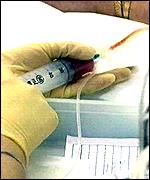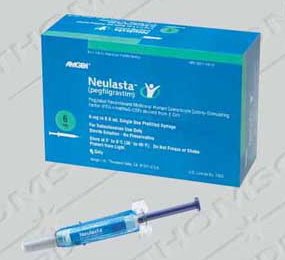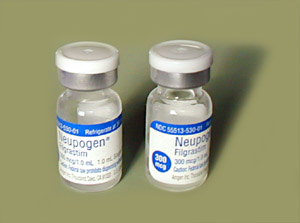 It’s my sixth and last chemo treatment – a day I should be celebrating, I suppose. But there’s not a whole lot of celebration in it, when I know I’m in for a whole lot of days of feeling terrible afterwards.
It’s my sixth and last chemo treatment – a day I should be celebrating, I suppose. But there’s not a whole lot of celebration in it, when I know I’m in for a whole lot of days of feeling terrible afterwards.I know the drill by now. Tap the porta-cath, draw the blood, see the doctor, then settle into the lounge chair for seven hours or so of IV drips.
A few things are different this time. Dr. Lerner shares a few more details about the radiation treatments. They’re likely to last, he says, for 4 or 5 weeks of five-day-a-week treatments – not the “3 weeks or so” he’d said earlier. (Note to self: Dr. Lerner has a way, it seems, of being intentionally vague about what’s ahead in the more distant future. Only as the date draws closer does he gets more specific. We’ve gone, in the past couple of months, from “a possibility” of radiation, to “3 weeks or so” of radiation to “4 or 5 weeks” of radiation. I suppose he feels it’s in the patients’ best interests to break such news to us slowly: but some of us would rather have the whole scoop, up front, so we know what’s ahead. Bottom line: as a person who wants to know exactly what’s ahead, I need to keep asking very specific questions.)
 Another thing that’s different is that I feel really bad during the treatment. In the past, I’ve mainly experienced the side-effects later, on subsequent days, but today I feel pretty queasy for most of the afternoon. I mention it to the nurses, and they’re sympathetic, but there’s not much they can do. I have a couple of roommates for short periods (their IV drips take much less time than mine), but shortly after the third one comes in, the nurse asks her to move out of my room into another one. She moves the trash can over next to my chair, in case the nausea gets the better of me.
Another thing that’s different is that I feel really bad during the treatment. In the past, I’ve mainly experienced the side-effects later, on subsequent days, but today I feel pretty queasy for most of the afternoon. I mention it to the nurses, and they’re sympathetic, but there’s not much they can do. I have a couple of roommates for short periods (their IV drips take much less time than mine), but shortly after the third one comes in, the nurse asks her to move out of my room into another one. She moves the trash can over next to my chair, in case the nausea gets the better of me. In the middle of the afternoon, one of the nurses comes in to share some “bad news” from the insurance company. It seems that Blue Cross/Blue Shield is no longer paying doctors enough to administer Neulasta shots and still break even financially (Neulasta is the injection I get 24 hours or so after each chemo treatment, to boost my white blood-cell count). This means that, because I’m a Blue Cross patient, they can no longer give it to me, as they have for my past 5 rounds of chemo treatments.
In the middle of the afternoon, one of the nurses comes in to share some “bad news” from the insurance company. It seems that Blue Cross/Blue Shield is no longer paying doctors enough to administer Neulasta shots and still break even financially (Neulasta is the injection I get 24 hours or so after each chemo treatment, to boost my white blood-cell count). This means that, because I’m a Blue Cross patient, they can no longer give it to me, as they have for my past 5 rounds of chemo treatments.I have two choices. The first is to come in daily for 4 or 5 days, maybe longer, for injections of Neupogen – an older, less expensive drug that’s equally effective, but much more inconvenient for patients in that it requires daily injections plus every-other-day blood tests to make sure it’s working right. My second choice is to order my own Neulasta through our pharmacy, bill it to my prescription plan, and plunk down a $100 co-pay.
 I don’t bother to ask why the doctor's office can’t just tack an extra hundred simoleons onto my bill and save me a trip to the pharmacy, because I think I know the answer. Under his contract with Blue Cross/Blue Shield, the doctor has to agree to negotiate his fees down to whatever Blue Cross/Blue Shield says they must be. To add a surcharge would violate the terms of that contract. So, the doctor simply says, “I’ll give you Neupogen instead – but if you should happen to show up with your own Neulasta, that’s OK with me.”
I don’t bother to ask why the doctor's office can’t just tack an extra hundred simoleons onto my bill and save me a trip to the pharmacy, because I think I know the answer. Under his contract with Blue Cross/Blue Shield, the doctor has to agree to negotiate his fees down to whatever Blue Cross/Blue Shield says they must be. To add a surcharge would violate the terms of that contract. So, the doctor simply says, “I’ll give you Neupogen instead – but if you should happen to show up with your own Neulasta, that’s OK with me.”I decide on spending the hundred bucks and ordering Neulasta through the pharmacy. I know that Dr. Lerner has billed my insurance $3000 for each of these shots in the past – so if that’s the full price, I figure I’m still getting a relative bargain. Since that’s my decision, says the nurse, I have two choices: I can either give myself the injection at home, or I can bring it into the doctor’s office and have them inject me, as before. I’ve never given myself or anyone else a hypodermic injection – and I’m not about to start – so I opt for bringing it into the doctor’s office.
It’s just one more example of how utterly and completely dysfunctional our health-care financing system has become. We’ve all received party invitations that say “B.Y.O.B.” (bring your own bottle). Now the system is inviting me, when I come for medical treatment, to “B.Y.O.D.” (bring your own drugs). Some nameless, faceless insurance-company functionary, with a stroke of a pen (or, more likely, a few clicks of the computer keyboard), has dropped the Neulasta reimbursement to less than the doctor’s wholesale price: and, in so doing, has made life much more difficult for cancer patients. The medical-insurance companies are losing their ethical moorings. They’ve forgetting why they’re in that business in the first place: to be partners in the work of healing. Now, it’s all about the money. Maybe it’s always been all about the money...

Claire shows up, drives me home, and heats up some chicken noodle soup, which she serves me with a couple pieces of toast. It’s about all I can manage, before an early bedtime.
3 comments:
Carl,
About 8 years ago my mother was part of a clinical trial with neupogen during her breast cancer chemotherapy. I would inject her with the neupogen every day for 10 days following her chemo. I was nervous at first giving her the shots, but got to the point where it became "old hat". Hope you are feeling better. -Regina Young
Carl,
I had a similar problem with Neulasta being so expensive, but I blame the drug manufacturer for pricing it so high. My HMO tried to negotiate a reasonable price for Neulasta, but the manufacturer refused, so now I'm getting 5 daily Neupogen shots instead of 1 Neulasta.
The nurse at my HMO said I could get Neupogen at the pharmacy for $900 per 5 days and self inject, but I would have to pay it all since my policy does not cover pharmacy drugs. Or I could come in daily for injections at the hospital and it would be covered. I went in daily for injections, and now the HMO is refusing to cover it anyway!
Since that's $900 x 4 cycles, I have to fight the bill. It's amazing what this system puts us through. Hang in there!
-Steve in Olympia, WA (non-Hodgkins lymphoma)
It's amazing to me, Steve, that the insurance company would put up a fight on paying something like Neulasta or Neupogen - since (to be absolutely mercenary about it) their costs would be so much higher in the event of some kind of low-white-count-induced infection that could land you in the hospital.
There's no logic to many of these insurance company decisions. As I've been saying, it's a system that has long been spinning out of any kind of rational contgrol. Bad management, in other words.
Post a Comment